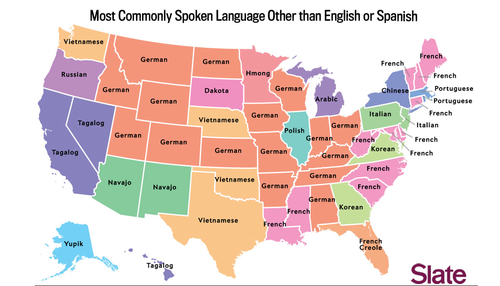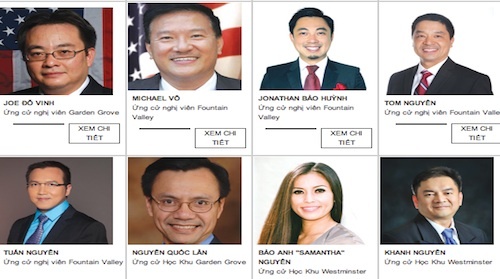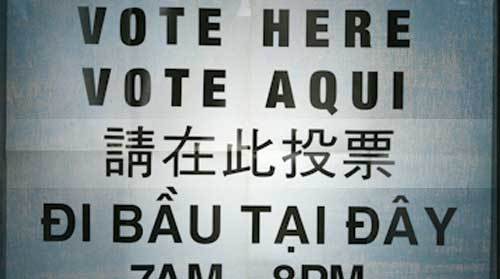In Orange County, California, home to Little Saigon and the largest Vietnamese American population outside of Vietnam, a whopping 19 Vietnamese American candidates are vying for 20 open seats this November. For the community, ethnic loyalties are helping to galvanize an electorate largely ignored by Republicans and Democrats alike.
It's a pattern playing out in API communities across the country.
According to the 2014 UCLA Asian Pacific American Political Almanac, there are currently some 4,000 Asian American and Pacific Islander elected officials and appointees from 39 states. Add to that the 22 Asian Americans currently running for Congress in 12 states and territories alone, a number that nearly doubled from 2008. There are another 159 APIs running for state legislature across the nation.
Those numbers help explain just why Asians around the country have increasingly turned out at the polls despite the fact that neither Republicans nor Democrats have worked to gain their support. A survey by the non-profit Asian Americans Advancing Justice (AAJC) showed 66 percent of API voters hadn't heard from Democrats, while 74 percent had not been contacted by Republicans.
Compare that to Latinos, who like APIs have fielded a growing number of candidates in recent years and stand poised to see a record number of congressional representatives come November. On both the state and national level, both parties have worked to outdo the other in winning the Latino vote.
It's a risky strategy, given that APIs overtook Hispanics in 2012 as the nation's fastest growing demographic group. While they only account for about 5 percent of the overall population, in key races theirs could prove the decisive vote. In districts with House races this year, for example, APIs make up roughly 10 percent of the voting age population, according to AAJC.
Add to that the fact that unlike Latinos, a sizable number of APIs remain undecided. The AAJC survey found that 46 percent of API voters had no political affiliation. The numbers tally with another survey by the Field Poll released last week that found the number of API voters in California had grown by 1 million since 1995 -- they now account for 10 percent of all voters in the state -- though more than half were undecided on their pick for California governor.
That race pits incumbent Jerry Brown against Indian American Neel Kashkari, who trails in the polls but has electrified the state's growing Indian American electorate.
In the Bay Area, home to a sizable API community, Asian candidates have proliferated in tandem with support from their base. San Francisco elected its first-ever Asian American mayor, Ed Lee, in 2011, with a strong turn out of Asian American voters, while another Chinese American, Jean Quan, currently serves as mayor of nearby Oakland. In San Jose, the heart of Silicon Valley and home to a Vietnamese population second only to Orange County in size, Madison Nguyen, a former Vietnamese boat person who became the first Vietnamese American elected to city council, currently serves as vice mayor.
"Asian Americans, while not a large share of the electorate nationally, could swing the outcome of many individual congressional races," noted AAJC. The base is energized for local candidates, in other words, but the votes for major races are largely up for grabs.
So if it isn't party affiliation, just what is getting APIs to the polls for these bigger races in such numbers? Indeed, the AAJC survey found some 60-77 percent of API registered voters nationally are expected to vote in November.
"The Asian American and Pacific Islander population continues to build a viable, multifaceted political infrastructure that will have an increasingly influential impact on American politics throughout the 21st century," predicted UCLA professor emeritus Don Nakanishi, one of the two leading specialists in Asian American politics.
The foundation of that infrastructure lies in areas like Little Saigon, a largely-immigrant enclave of roughly 200,000. Candidates there have been busy rallying their constituencies, fundraising and campaigning via access to local churches and the ethnic media, channels that the larger political establishments have either ignored or failed to engage. In Little Saigon, politicians go door-to-door and mall-to-mall to get voters to the voting booth.

Slate's language map.
And if turnout numbers are as high as AAJC expects, hitting the pavement like that to reach undecided API voters could pay off in swing states like Nevada or Georgia, where Tagalog and Korean are the third largest languages spoken after English and Spanish, respectively.
Santa Clara University Professor James Lai, who co-edited the UCLA almanac, noted these local outreach efforts by API candidates in places with growing Asian American populations would be key to determining the "political future of Asian Americans." And it goes without saying that major candidates who ignore this growing political powerhouse will do so at their own peril.
Related article:
Why Candidates Shouldn't Ignore Asian-American Voters
________________
Andrew Lam is an editor with New America Media and author of "Perfume Dreams: Reflections on the Vietnamese Diaspora," and "East Eats West: Writing in Two Hemispheres." His latest book is "Birds of Paradise Lost," a short story collection, was published in 2013 and won a Pen/Josephine Miles Literary Award in 2014.


